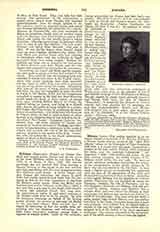

Bibbiena (BERNARDO Dovizl) an Italian Cardinal and comedy-writer, known best by the name of the town Bibbiena, where he was born August 4, 1470; d. at Rome, November 9, 1520. His obscure parentage did not prevent him from securing a literary training at the hands of the best scholars and from associating with the most conspicuous men that Florence could boast. A jovial temper and racy Tuscan wit enhancing the charm of good looks and courtly manners soon made him the preceptor as well as the boon companion of Giovanni dei Medici’s merry hours. When the Medici were banished and sorrow followed mirth (November, 1494) it was seen that a gay man of the world could become a brave and steadfast friend. Not long after, the protection of Julius II and many honors at the Roman court were to be his reward. In 1513 his strenuous exertions on behalf of his lifelong patron secured the election of Giovanni dei Medici to the pontifical throne. Such services Leo X repaid by bestowing on him the purple robe, appointing him his treasurer and entrusting him with many important missions, among them a legation to France (1518). Later on, the cardinal’s strong sympathies for France lost him Leo’s confidence. The story, however, that he was poisoned‚Äû in spite of Giovio and Grassi’s reports, has absolutely no foundation. (Pastor, Geschichte der Papste, IV, Part I, Leo X.) As cardinal he steadily extended a generous patronage to art. From Raphael, whose devotion he won, we have his best likeness. His literary fame is mainly connected with the first good comedy written in Italian prose, “La Calandra” (also, known as “Il Calandro” and “La Calandria”), a distinctly juvenile production, probably give n for the first time at Urbino, about 1507, and very elaborately performed at Rome, seven years later, in the presence of Leo X and Isabella Gonzaga d’Este, Marchioness of Mantua. Though marred by many scenes glaringly immoral, and though built upon the plot of Plautus’s “Menaechmi”, it possessed the features of modern comed and won plaudits for its sparkling wit and fine characterization. Ariosto and Machiavelli imitated him in their plays. The latest edition of “La Calandra” is in the “Teatro Italiano Antico” (Florence, 1888).
EDOARDO SAN GIOVANNI

